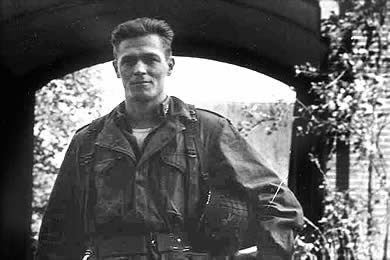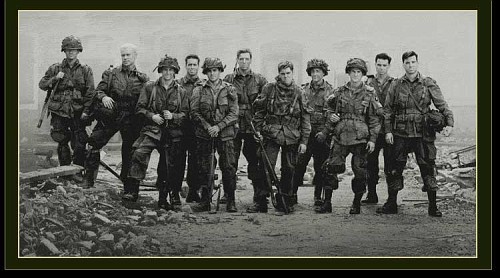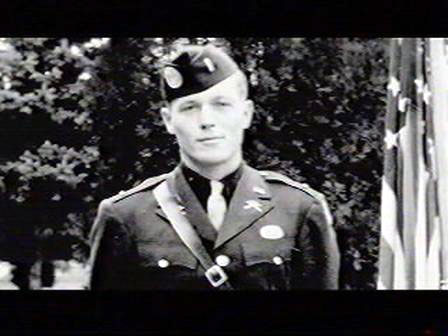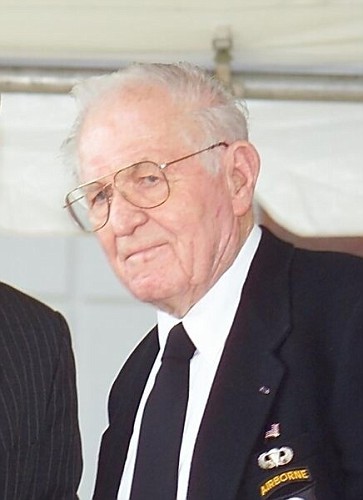|
Major Richard "Dick" D. Winters (January 21, 1918 - January 2, 2011) was a United States Army officer and decorated war veteran. He commanded Company "E", 2nd Battalion, 506th Parachute Infantry Regiment, 101st Airborne Division, during World War II. Winters parachuted into Normandy in the early hours of D-Day, and fought across France, Belgium, the Netherlands, and eventually into Germany. Later in the war, Winters rose to command the 2nd Battalion. Following the end of hostilities Winters was discharged from the army and returned to civilian life, working in New Jersey. France, Belgium, the Netherlands, and eventually into Germany. Later in the war, Winters rose to command the 2nd Battalion. Following the end of hostilities Winters was discharged from the army and returned to civilian life, working in New Jersey. In 1951, during the Korean War, Winters was recalled to the Army from the inactive list and briefly served as a regimental planning and training officer on staff at Fort Dix, New Jersey. Although issued orders for deployment, he was not sent to Korea. After his discharge he worked at a few different jobs before founding his own company and selling farming products. Winters was featured in a number of books and was portrayed in the 2001 HBO mini-series Band of Brothers by Damian Lewis. He was a regular guest lecturer at the United States Military Academy at West Point. He retired in 1997. Richard Winters was born in Ephrata, Pennsylvania to Richard and Edith Winters on January 21, 1918. He moved to nearby Lancaster when he was eight years old. He graduated from Lancaster Boys High School in 1937 and matriculated to Franklin and Marshall College. While in college, Winters worked a number of jobs, including mowing lawns, working in a grocery store and painting electrical towers in order to pay for his tuition. In June 1941 he graduated with a degree in business. |
|
World War II
Winters enlisted in the army on August 25, 1941, in order to shorten his time in service. In September he underwent basic training at Camp Croft, South Carolina. Afterwards he remained at Camp Croft to help train draftees and other volunteers, while the rest of his battalion was deployed to Panama. In April 1942 he was selected to attend Officer Candidate School at Fort Benning, Georgia. It was there he met his friend Lewis Nixon, with whom he would serve throughout the war in the 101st Airborne Division. He was commissioned as a second lieutenant after graduation from OCS on July 2, 1942. During the course of his officer training, Winters reached the decision that he wanted to join the parachute infantry. Upon completing training he returned to Camp Croft to train another draft as there were no positions available in the paratroopers at that time. After five weeks he received orders to join the 506th Parachute Infantry Regiment at Camp Toccoa (formerly Camp Toombs) in Georgia. He arrived at Toccoa in mid-August 1942 and was assigned to Company E, 2nd Battalion, 506th PIR, serving under First Lieutenant (later Captain) Herbert Sobel. Company E was also known as "Easy Company" per the contemporaneous Joint Army/Navy Phonetic Alphabet. Initially he served as a platoon leader in charge of 2nd Platoon, but later, in October 1942, he was promoted to first lieutenant and became the acting company executive officer (XO), although this was not made official until May 1943. The 506th PIR was an experimental unit, being the first regiment to undertake airborne training as a formed unit. As many of the men had very little previous military experience the training at Toccoa was necessarily very tough and as a consequence there was a high level of personnel wastage. Indeed, of the 500 officers who had volunteered only 148 successfully completed the course. The enlisted men had it equally tough, with only 1,800 men being selected out of 5,300 volunteers. previous military experience the training at Toccoa was necessarily very tough and as a consequence there was a high level of personnel wastage. Indeed, of the 500 officers who had volunteered only 148 successfully completed the course. The enlisted men had it equally tough, with only 1,800 men being selected out of 5,300 volunteers. On June 10, 1943, the 506th PIR was officially attached to the 101st Airborne Division. Later in the year they embarked on the Samaria bound for England, arriving there on September 15, 1943, and disembarking in Liverpool. They then proceeded to Aldbourne, in Wiltshire where they began an intense training program designed to make the regiment ready for the invasion of Europe that was planned for 1944. It was while Easy Company was based at Aldbourne that the tension and competition that had been brewing between Winters and Sobel came to a head in November–December 1943. Winters had privately held concerns over Sobel's ability to lead the company in combat for some time before this and many of the enlisted men in the company had come to respect Winters for his competence and had also developed their own concerns about Sobel's leadership. For his own part, Winters has stated that he never wanted to compete with Sobel for command of Easy Company. However, the situation became out of hand when Sobel attempted to bring Winters up on charges for failure to carry out a lawful order. Feeling that his punishment was unjust, Winters requested that the charge be tried by court martial. When Winters' punishment was set aside by the battalion commander, Sobel proceeded to charge Winters with another, separate charge the following day. While the investigation was being undertaken, Winters was moved out of the company and transferred to the headquarters company and appointed as the battalion mess officer. Following this, although Winters tried to talk them out of it, a number of the company's noncommissioned officers (NCOs) gave the regimental commander, Colonel Robert Sink, an ultimatum: either Sobel be replaced, or they would hand back their stripes. Sink was not impressed and a number of the NCOs were subsequently demoted and transferred out of the company. Nevertheless, he realized that something had to be done about the situation and decided that Sobel had to be replaced. Sobel was transferred out of the unit and given command of a newly formed parachute training school. Winters' court martial was then set aside and he returned to Easy Company as platoon leader of 1st Platoon. Despite their personality clash, Winters later stated that he felt that at least part of Easy Company's success had been due to the training that Sobel had put them through and the way he had built the team. In February 1944, First Lieutenant Thomas Meehan III was given command of Easy Company. Meehan remained in command of the company until the Normandy invasion, when at approximately 1:15 a.m. on June 6, 1944, the C-47 Skytrain transport that the company headquarters section were in was shot down by German anti-aircraft fire, killing everyone on board. Winters jumped that night and landed safely near Sainte-Mère-Église. After having lost his weapon during the drop, he was able to orient himself, collect several paratroopers, including members of the 82nd Airborne, and proceed toward the unit's assigned objective near Sainte-Marie-du-Mont. Without knowing the fate of Lieutenant Meehan, Winters became the acting commanding officer of Easy Company for the duration of the Normandy campaign. Later that day, Winters led an attack that destroyed a battery of German 105 mm howitzers which were firing onto the causeways that served as the principal exits from Utah Beach. The guns were defended by approximately one platoon of fifty German troops, while Winters had only thirteen men. This action south of the village of Le Grand-Chemin is often referred to as the Brécourt Manor Assault. The attack is still taught at the military academy at West Point as an example of a textbook assault on a fixed position. In addition to destroying the battery, Winters also obtained a map detailing all German defenses in the Utah Beach area. On July 1, 1944, Winters received notification that he had been promoted to captain. The following day he was presented with the Distinguished Service Cross by General Omar N. Bradley, who was then the commanding officer of the First Army. Shortly thereafter the 506th was withdrawn from France and returned to Aldbourne in England for reorganization. In September 1944, the 506th PIR took part in Operation Market Garden, an airborne operation in the Netherlands. On October 5, 1944, a strong German force launched an attack on the 2nd Battalion's flank, and threatened to effect a breakthrough of the American lines. At the same time, a patrol from Easy Company was contacted and all four men were wounded. Returning to the headquarters, they reported that they had encountered a large group of Germans at a crossroads about 1,300 yards (1,200 m) to the east of the company command post. Realizing the seriousness of the situation, Winters took one squad from 1st Platoon, and moved off toward the crossroads, where they observed a German machine gun firing away to the south, toward the battalion headquarters. After conducting a reconnaissance of the position, Winters then proceeded to lead the squad in an assault on the gun crew. Soon after they had taken the position, the squad began taking fire from a German position opposite them. Estimating that this position was held by at least a platoon-sized element, Winters called for reinforcements from the rest of the 1st Platoon, and then proceeded to lead them in an assault. Later it was discovered that they had in fact been up against a force of at least 300 men. Shortly after this incident, on October 9, Winters became the battalion XO. Although this position was normally a major's billet, Winters filled it while still a captain. On December 16, 1944, the Germans launched a counter-offensive against the Western Allies in Belgium. After the 101st Airborne was moved by truck to the Bastogne area on December 18. Still serving as XO of the 2nd Battalion, Winters took part in the defense of the line northeast of Bastogne near the town of Foy during what became known as the Battle of the Bulge. The entire 101st Airborne and elements of the 10th Armored Division held off a force of about fifteen German divisions, supported by heavy artillery and armor, for nearly a week before elements of the U.S. Third Army broke through the German lines surrounding Bastogne. Bastogne area on December 18. Still serving as XO of the 2nd Battalion, Winters took part in the defense of the line northeast of Bastogne near the town of Foy during what became known as the Battle of the Bulge. The entire 101st Airborne and elements of the 10th Armored Division held off a force of about fifteen German divisions, supported by heavy artillery and armor, for nearly a week before elements of the U.S. Third Army broke through the German lines surrounding Bastogne. After being relieved, the 2nd Battalion carried out an attack on Foy on January 9, 1945. On March 8, 1945, following the 2nd Battalion's move to Haguenau, Winters was promoted to major and shortly afterward he was made acting battalion commander of 2nd Battalion, when Lieutenant Colonel Strayer was elevated to the regimental staff. As it turned out, 2nd Battalion saw little combat after this. In April the battalion carried out defensive duties along the Rhine, before deploying to Bavaria later in the month. In early May the 101st Airborne Division received orders to capture Berchtesgaden. The 2nd Battalion set out from Thalham, Germany, and forcing its way through streams of surrendering German soldiers, led the way to the alpine retreat, reaching the town at noon on May 5, 1945. They were still there when the war ended three days later on May 8, 1945. After the end of hostilities Winters remained in Europe as the process of occupation and demobilization began. Even though he had enough points to return to the United States, he was told that he was needed. Later, he was offered a Regular commission, but declined it. He finally embarked from Marseilles aboard the Wooster Victory on November 4, 1945. He was separated from the Army on November 29, 1945 although he was not officially discharged until January 22, 1946 and he remained on terminal leave until then. Winters was recommended for the Medal of Honor for his leadership at Brécourt Manor, but due to the quota system which limited the distribution of the award to only one per division, and since one Medal of Honor had already been awarded—to Lieutenant Colonel Robert G. Cole—the recommendation was downgraded to the Distinguished Service Cross, the U.S. Army's second highest award for combat valor. After the release of the Band of Brothers television miniseries, a letter-writing campaign to have Winters awarded the Medal of Honor retroactively was started, but so far without success. Currently, Rep. Tim Holden (D-PA) has introduced HR 3121 (111th) "To authorize and request the President to award the Medal of Honor to Richard D. Winters, of Hershey, Pennsylvania, for acts of valor on June 6, 1944, in Normandy, France, while an officer in the 101st Airborne Division." The bill currently has been referred to the House Armed Services Committee and the House Armed Services Committee, Subcommittee on Military Personnel. |
|
Korean War
Following the war, Winters worked for his close wartime friend Captain Lewis Nixon at Nixon's family business, Nixon Nitration Works of Edison, New Jersey, rising to become general manager in 1950. On May 16, 1948 he married Ethel Estoppey and continued to pursue his education through the GI Bill, attending a number of business and personnel management courses at Rutgers University. In June 1951 he was recalled to active duty in the Army during the Korean War. He was ordered to join the 11th Airborne Division at Fort Campbell, Kentucky, but he was given six months to report and in this time he traveled to Washington, D.C. to speak to General Tony McAuliffe, in the hope that he could convince the Army not to send him to Korea. He explained to McAuliffe that he had seen enough of war and apparently McAuliffe understood his position, but explained that he was needed because of his command experience. Winters then reported to Fort Dix, New Jersey, where he was assigned as a regimental planning and training officer. While at Fort Dix, Winters became disillusioned with his job, finding that he had little enthusiasm for training officers who lacked discipline and did not attend their scheduled classes. As a result he volunteered to attend the Ranger School. He then received orders to deploy to Korea and travelled to Seattle, where during pre-deployment administration he was offered the chance to resign if he wanted to. Later years and death
He was discharged from the army and became a production supervisor at an adhesive plaster mill in New Brunswick, New Jersey. In 1951 he and his wife Ethel bought a small farm where later Winters built their farmhouse and together they raised two children. In 1972 he went in to business for himself, starting his own company and selling animal feed products to farmers throughout Pennsylvania. Soon afterward, he moved his family to Hershey, Pennsylvania. He finally retired in 1997. selling animal feed products to farmers throughout Pennsylvania. Soon afterward, he moved his family to Hershey, Pennsylvania. He finally retired in 1997. During the 1990s Winters featured in a number of books and television series about his experiences and those of the men in Easy Company. In 1992, Stephen Ambrose wrote the book Band of Brothers: Easy Company, 506th Regiment, 101st Airborne from Normandy to Hitler's Eagle's Nest, which was subsequently turned into an HBO miniseries Band of Brothers. Winters was also the subject of the 2005 book Biggest Brother: The Life of Major Dick Winters, The Man Who Led the Band of Brothers, written by Larry Alexander. His own memoir, Beyond Band of Brothers: The War Memoirs of Major Dick Winters, co-written by military historian and retired U.S. Army Colonel Cole C. Kingseed, was published in early 2006. He also gave a number of lectures on leadership to cadets at the United States Military Academy at West Point. On May 16, 2009, Franklin and Marshall College conferred an Honorary Doctorate in Humane Letters upon Winters. Despite the many accolades he had received, Winters remained humble about his service. During the interview segment of the miniseries Band of Brothers, Winters quoted a passage from a letter he received from Sergeant Mike Ranney, "I cherish the memories of a question my grandson asked me the other day when he said, 'Grandpa, were you a hero in the war?' Grandpa said 'No… but I served in the company of heroes.'" Winters, a resident of Hershey, Pennsylvania, died on January 2, 2011, in nearby Campbelltown, Pennsylvania. He had been suffering from Parkinson's disease for several years. Winters had requested a private, unannounced funeral service, which was held on January 8, 2011. Winters is buried in Bergstrasse Evangelical Lutheran Church Cemetery in Ephrata. He is buried next to his parents in the Winters family plot. His grave is marked Richard D. Winters WW II 101st Airborne. |


